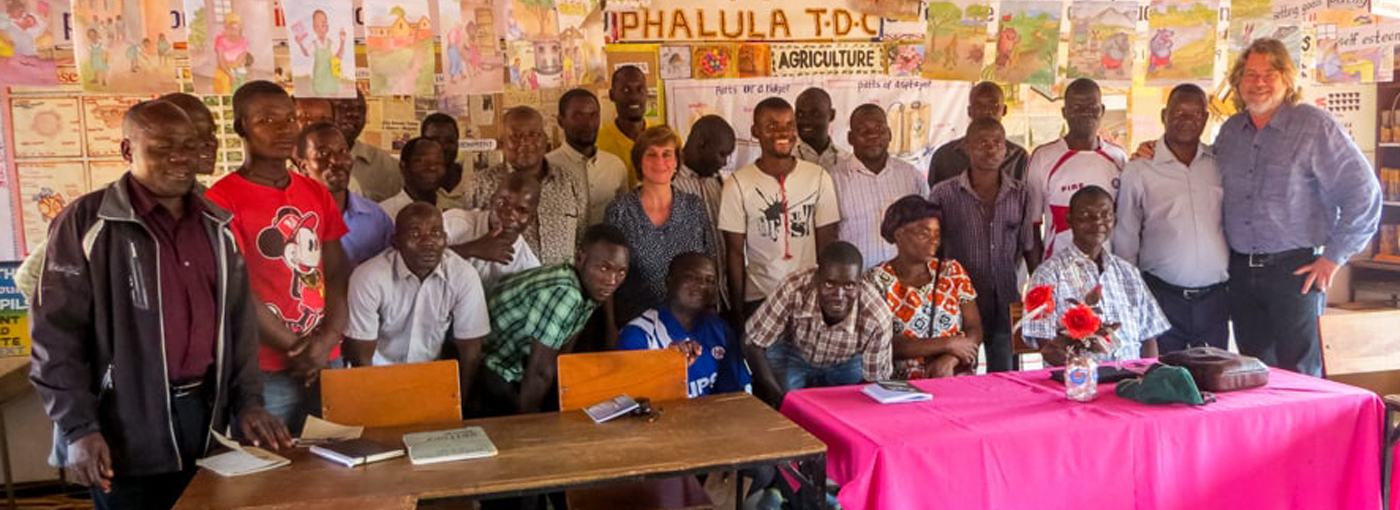
Action research
The CLIM2 project engages in an inclusive market-oriented approach. A wide spectrum of value chain actors (input suppliers, producers, output markets, support services, policy makers) identify and address the challenges and opportunities within an array of crop and livestock enterprises. Special attention will be given to the development of existing and new (if appropriate) viable small and medium enterprises (SME) and support services already operating within the target districts to develop diversified and integrated crop-livestock systems with strong market linkages. The project, enabling smallholder farmers to increase their income from crop and livestock activities, will not only increase their cash incomes from selling produce and improve their nutritional status but also enable long-term planning and reinvestments to improve their farming business.
Innovation Platforms (IPs) will choose preferential options and entry points for the various value chains, and facilitate the interrelated and mutually supportive institutional and technological innovations, based on commonly agreed visions and feedback mechanisms. Initially, the IPs, informed and guided by solid baseline and value chain research, will identify market opportunities and lucrative value chains among a wide range of cereal, legume, roots and tubers and vegetable crops in addition to small ruminants, pigs, chicken and cattle. Work on the reduction of losses and value addition at farm level will focus on improved post-harvest management including threshing, shelling of groundnuts and storage techniques and on increasing the value of crops and their by-products through processing/milling, for on and off-farm food and livestock value chains, where appropriate attention will be given to food safety standards, including aflatoxin control. This work will be closely integrated with generation and support of Small and Medium Enterprises (SME) around harvest, storage, and food, feed, fodder and fuel processing. Small and medium enterprises providing post-harvest, feed and food processing services (such as groundnut shelling, animal feed processing from by-products of various crops, and food processing under clean and sanitary conditions) will be evaluated and established.
Throughout the process, cross-scale dialog, knowledge generation and learning across the value chains will translate into capacity building and improved self-organization of value chain actors, using conventional co-learning and ICT approaches. Engaging higher level policy and decision makers from the onset of the project will help create conducive context and enable these value chains to operate efficiently.
Key stakeholders in the agricultural sector, main actors in the IPs and immediate users of this research comprise women and men farmers, agro-dealers, middlemen, traders, food processors and agro-business entrepreneurs, researchers, rural extension, development, higher level decision and policy makers. The main target groups will be
- Smallholder farmers in rural communities including the youth, women and vulnerable farm households
- Existing and potential Small and Medium Entrepreneurs (SMEs) involved in crop and livestock input supply and output processing and marketing
Research Outputs
Conferences
- Assessing the institutional environment for inclusive livestock value chains in Malawi,
oral presentation at ANH 2020 conference, 02 July 2020, in Lilongwe. - Diversifying agri‐food value chains in Southern Malawi
Posters
- Feast: Feed assessment tool
- Agribusiness development: Farming to markets
- How can crop-livestock integration enhance food security and nutrition in southern Malawi?
- Where are our profits? Farmers using gross margin analysis tool
- Boosting chicken production for markets: nutrition and income for smallholder farmers
- Fixing the dairy value chain: fodder and milk processing – BVUMBWE dairy co-op
- Applied training on feed formulation, feeding and fodder production
- Pulling goats through markets: Gains from quality meat supply
- Training to innovate: Knowledge and skills for better self-organization
Annual Narrative Reports
- Annual Narrative Report (2018-2019)
- Annual Narrative Report (2017-2018)
IP Reports
IP meetings 2019
Innovation Platform meetings 2017
Policy Dialogue reports
Policy dialogue 2019
- CLIM2 Introduction
- Activities, rational, status, plans: feed work, feeding
- Crop Livestock Integration and Marketing in Malawi (CLIMM)
- Diversifying agri‐food value chains in Southern Malawi
- Links between Agri-Food Value Chains & Nutrition
- Policies and Support Mechanisms for Growth of Agri-Food Value Chain
- Policies Supporting Agri-food Value Chains in Malawi
- Policy Dialogue Meeting Report
Presentation to the District Executive Committee (DEC)
- District Executive Committee Meetings 2019

